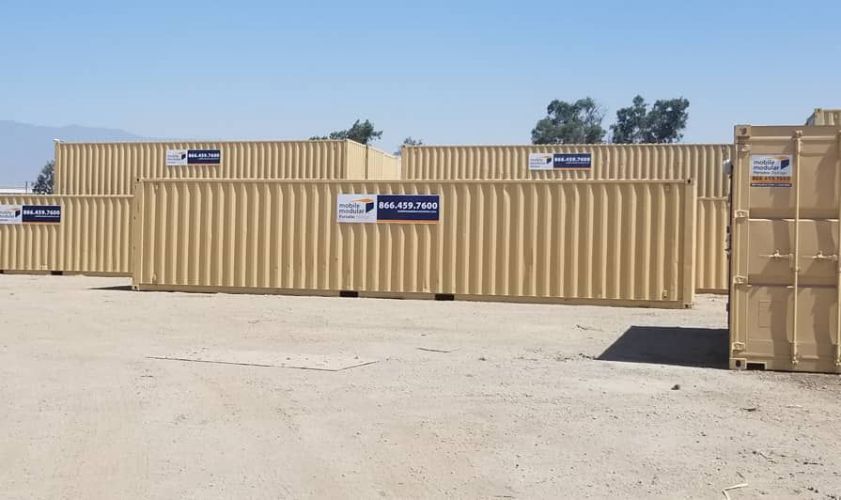- Rent, Lease, or Purchase
- |
October 9, 2020
How Long Do Shipping Containers Last?

Shipping containers can be used across a number of industries, from agriculture to automotive, education to retail and more. In some cases, people have even found ways to convert shipping containers into residences. Of course, when it comes to our businesses and our homes, we want to make sure they’ll last.
What does a shipping container’s lifespan look like, really? Can inclement weather conditions affect their durability? What kind of maintenance do they require and how often must it be performed? Keep reading for answers to these questions and other important information on how long shipping containers last.
Determining How Long Shipping Containers Last
How long does a shipping container last? The answer, you’ll find, depends on various factors. Check out the list below for more information on shipping containers and their lifespan.
Weather
Shipping containers are typically made of steel, which makes them incredibly durable. At the same time, it leaves them susceptible to certain kinds of wear and tear. Pooled water and exposure to salt air often appear at the top of that list and can lead to corrosion, which will degrade the foundation of your shipping container.
Dents and Damage
While a certain amount of wear and tear is normal, certain degrees of damage can age your shipping container. Dents in the outer shell and cracks in the paint can invite rust and shorten the lifespan of your container.
How it’s Being Used
As we discussed above, shipping containers can be used in a variety of ways. Some will contribute to a longer lifespan than others. Shipping containers that are used to transport goods by sea will be more exposed to water, wind and other elements that can shorten the container’s window of usability. Containers used for simple storage or additional office space will likely face less damage over time.
Used vs. New
While many people choose to invest in a used shipping container, it’s important to inspect its condition before purchase. Used shipping containers might be weathered or damaged in ways that will severely impact their lifespan. Of course, there are different degrees of usage. They include:
- One trip/Single haul: These containers are almost new, having been used just once.
- As is: These containers tend to be in pretty good shape, but have likely sustained some wear and tear. The price should reflect its current condition.
- Dangerous Goods: These containers may have been used to transport hazardous chemicals or waste materials in the past, meaning they aren’t ideal to repurpose. It’s best for these containers to perform the same use as in the past.
How To Make Your Shipping Container Last
Different agencies will give you different estimates on shipping containers and their lifespan. In general, it’s believed containers can last anywhere from 10 to 25 years without much maintenance. When well-cared for, some experts suggest they can last up to 50 years. To bring you closer to that mark, we’ve listed some important things to keep in mind when caring for your shipping container.
Store it Somewhere Dry
It is important to minimize your shipping container’s contact with moisture to keep it in good condition. If you cannot prevent your storage container away from damp ground, think about ways to keep it elevated. Steel supports or plastic pallets can prevent water from pooling around your container and prevent corrosion from taking place.
Keep it Painted
A layer of paint can also help protect your container from the elements, which can prevent rust and improve the lifespan of your shipping container. Regular Maintenance As mentioned above, it’s normal for a shipping container to sustain a certain amount of wear and tear, but a failure to address this kind of damage will greatly affect how long it will last.
Regular inspections will help you identify problem areas to address before damage becomes permanent. It’s also important to clear the roof regularly. Excess debrief can trap in moisture and cause the container to deteriorate.
Reduce Internal Condensation
It’s important to pay just as much attention to the interior of your container as you do its exterior. Make sure to keep things ventilated inside, which will prevent moisture from setting in. Rubber seal doors will prevent any water from entering the container. When purchasing, make sure to inspect the condition of the seals. Any damage will lead to limited protection against water damage.
Discover containers and portable office storage with Mobile Modular Portable Storage. We are one of the largest suppliers of portable containers throughout the nation. Our industry-best equipment is well maintained and delivered by our team of experts. We can also help you prepare your site in advance, ensuring your container will last as long as possible.
We are here to help you find the right solution to your storage needs. Check out our full range of portable storage and office containers. You can also call us at 866-459-7600 for more information.
Related Blogs



Subscribe to Our Blog
Enter your email address to subscribe to the blog and receive the notification of new posts by email.
Thank You for Subscribing to Our Blog!
Stay tuned for upcoming emails with valuable content that we hope will enhance your experience with our brand.
Both Pardot and mg360 form submissions failed.
